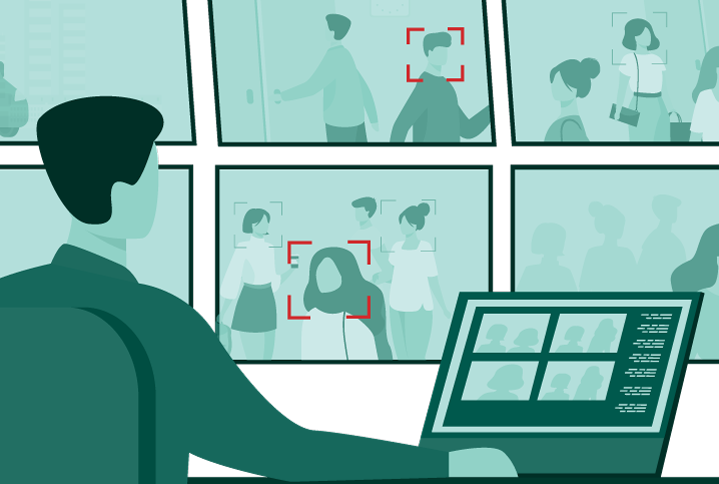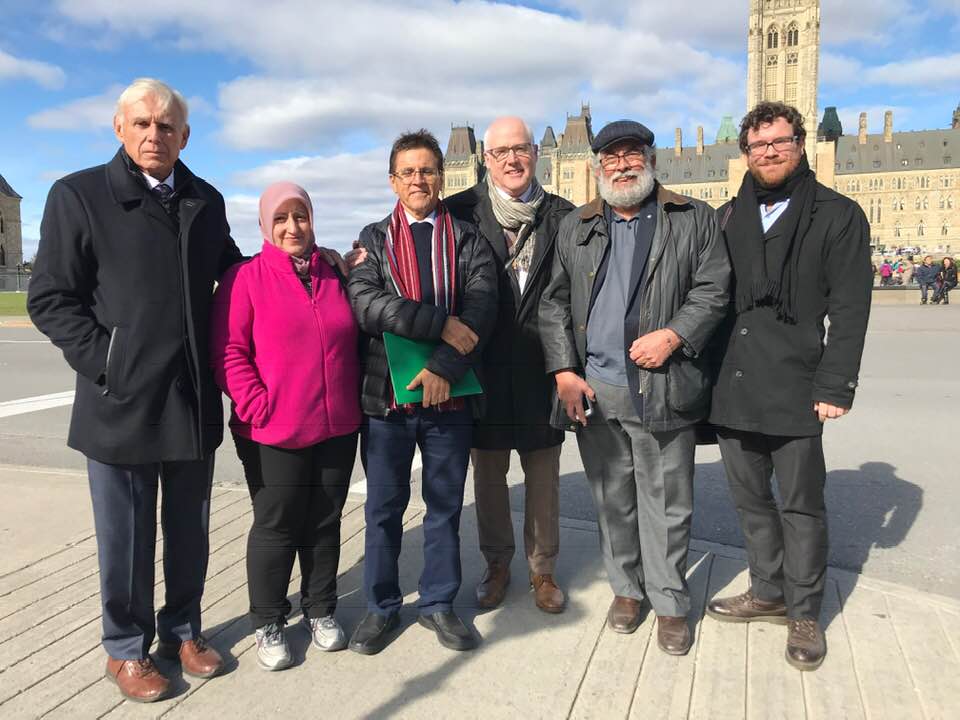FLICKR/Kate Kehoe
By David Lyon
The International Civil Liberties Monitoring Group (ICLMG) was founded in response to the aftermath of 9/11, with its global search for terrorists, facilitated in part by massive surveillance initiatives. During the next few years, what was then known as The Surveillance Project, at Queen’s University in Kingston, began a fruitful partnership with the ICLMG, initiated by Roch Tassé, the group’s first National Coordinator. The concern with state and especially security surveillance was maintained throughout several major research projects and ensuing publications.
At Queen’s, we were excited to be working with an organisation devoted to maintaining civil liberties in Canada and to blowing the whistle when such liberties were undermined through inappropriate surveillance activities. The need for such work was patently clear from 2002 when Canadian telecoms engineer Maher Arar was detained at JFK Airport, New York and then transferred to Syria, where he was held in inhuman conditions, interrogated and tortured. Erroneous surveillance information was at the source of the problem.
Roch Tassé, representing the ICLMG, took part in research projects conducted at Queen’s University early on. Workshop contributions by the ICLMG appeared in books such as Global Surveillance and Policing: Borders Security, Identity1Elia Zureik and Mark Salter, Global Surveillance and Policing: Borders Security, Identity, Routledge, 2005. and in articles such as “Airport screening, surveillance and social sorting: Canadian response to 9/11 in context.”2David Lyon, “Airport screening, surveillance and social sorting: Canadian response to 9/11 in context,” Canadian Journal of Criminology and Criminal Justice, 2006: https://ojp.gov/ncjrs/virtual-library/abstracts/airport-screening-surveillance-and-social-sorting-canadian Other contributions include participation in Colin Bennett and David Lyon’s edited Playing the Identity Card: Surveillance, Security and Identification in Global Perspective3Colin J. Bennett and David Lyon, Playing the Identity Card: Surveillance, Security and Identification in Global Perspective, Routledge, 2008. and in Kirstie Ball and Laureen Snider’s edited collection, The Surveillance‑Industrial Complex.4Kirstie Ball and Laureen Snider, The Surveillance-Industrial Complex: A Political Economy of Surveillance, Routledge, 2013 The ICLMG collaborated with Queen’s University’s Surveillance Studies Centre (SSC) which formally opened in 2009.
In 2015, Monia Mazigh, ICLMG’s newly appointed National Coordinator, worked with the Queen’s SSC on the New Transparency project.5Colin J. Bennett, Kevin D. Haggerty, David Lyon, and Valerie Steeves, Transparent Lives: Surveillance in Canada, AU Press, 2014. In 2016, Tim McSorley, ICLMG’s next National Coordinator, became involved as a partner with the Big Data Surveillance (BDS) Project, and presented in a workshop which later became a chapter in the book Big Data Surveillance and Security Intelligence: The Canadian Case6David Lyon and David Murakami Wood, Big Data Surveillance and Security Intelligence: The Canadian Case, UBC Press, 2021. published in 2021. The chapter, co-authored by Xan Dagenais, ICLMG’s Communications and Research Coordinator, is entitled “Confronting Big Data: Popular Resistance to Government Surveillance in Canada since 2001”. The ICLMG also presented in the last BDS conference and participated in the final BDS report, which was published in 2022: Beyond Big Data Surveillance: Freedom and Fairness.7Big Data Surveillance Project, “Beyond Big Data Surveillance: Freedom and Fairness. A Report for all Canadian citizens,” Surveillance Studies Centre, Queen’s University, May 18, 2022: https://www.surveillance-studies.ca/sites/sscqueens.org/files/bds_report_eng-2022-05-17.pdf
The Big Data Surveillance project was the culmination of many years of working with partners like the ICLMG and focused on the massive growth in “dataveillance” in every area of life. We explored together the use of massive troves of data that became available as social media users unwittingly offered details of their lives to platforms such as Google, which quickly realized there was a profit to be made with the data. Today, data is also sought for policing, national security and other government-related purposes, which raises acute civil liberties as well as data justice and digital rights issues. Big Data—now augmented by AI—also plays a significant role in perpetuating social inequalities along familiar lines of class, race and gender.
Our research partnership findings have had a real impact, not only through academic publications and op-eds or media interviews, but also by contributing to the regulation of platform companies, to popular resistance to some of their most negative effects, and to the quest for alternative ways of handling data – not merely data “on” people, but “for” and “with” those whose data is collected, analyzed and acted on. While our research includes international partners, we’ve always worked to bring home the challenge of today’s surveillance to those living in Canada, through freely available and accessible writings.
The most recent report, Beyond Big Data Surveillance: Freedom and Fairness, for example, highlights the lopsided nature of information, whereby organizations “know” more and more about us, while we know less and less about what they are doing. The report refers to this as “tangled surveillance”, where very complex technologies operate in ways that are obscure to most of us and yet are only met with very weak and inadequate instruments that are unable to limit their negative power. Furthermore, the report indicates which groups are most exposed and vulnerable to “big data surveillance.”
But these are just the technical aspects of our partnership between the SSC and the ICLMG. Being involved in common projects, with like-minded people, is what makes this collaboration magical. The SSC is an academic research group; the ICLMG is a politically active coalition of civil liberties organizations. But we share the common goal of understanding and regulating surveillance which is effectively addressed by working together. It is a worthwhile, mutually beneficial relationship to which we each contribute and for which both parties are grateful. We would each be poorer without the other.
While our respective members do academic and advocacy work, together we work towards the same goals with complementary tactics, and this is what makes the partnership so meaningful and so fulfilling. So thank you, Roch, Monia and Tim—along with those who have worked with you at ICLMG— for being willing to partner with us at the SSC. Our work has been all the more grounded for what you’ve taught us, and we believe that your work has been enhanced by the results of our research.
Best wishes for the next 20 years!
David Lyon is Professor Emeritus of Sociology and Law at Queen’s University, Kingston, and author of many books, most recently Surveillance: A Very Short Introduction (Oxford 2024).
Since you’re here…… we have a small favour to ask. Here at ICLMG, we are working very hard to protect and promote human rights and civil liberties in the context of the so-called “war on terror” in Canada. We do not receive any financial support from any federal, provincial or municipal governments or political parties. You can become our patron on Patreon and get rewards in exchange for your support. You can give as little as $1/month (that’s only $12/year!) and you can unsubscribe at any time. Any donations will go a long way to support our work. |
Footnotes
- 1Elia Zureik and Mark Salter, Global Surveillance and Policing: Borders Security, Identity, Routledge, 2005.
- 2David Lyon, “Airport screening, surveillance and social sorting: Canadian response to 9/11 in context,” Canadian Journal of Criminology and Criminal Justice, 2006: https://ojp.gov/ncjrs/virtual-library/abstracts/airport-screening-surveillance-and-social-sorting-canadian
- 3Colin J. Bennett and David Lyon, Playing the Identity Card: Surveillance, Security and Identification in Global Perspective, Routledge, 2008.
- 4Kirstie Ball and Laureen Snider, The Surveillance-Industrial Complex: A Political Economy of Surveillance, Routledge, 2013
- 5Colin J. Bennett, Kevin D. Haggerty, David Lyon, and Valerie Steeves, Transparent Lives: Surveillance in Canada, AU Press, 2014.
- 6David Lyon and David Murakami Wood, Big Data Surveillance and Security Intelligence: The Canadian Case, UBC Press, 2021.
- 7Big Data Surveillance Project, “Beyond Big Data Surveillance: Freedom and Fairness. A Report for all Canadian citizens,” Surveillance Studies Centre, Queen’s University, May 18, 2022: https://www.surveillance-studies.ca/sites/sscqueens.org/files/bds_report_eng-2022-05-17.pdf




